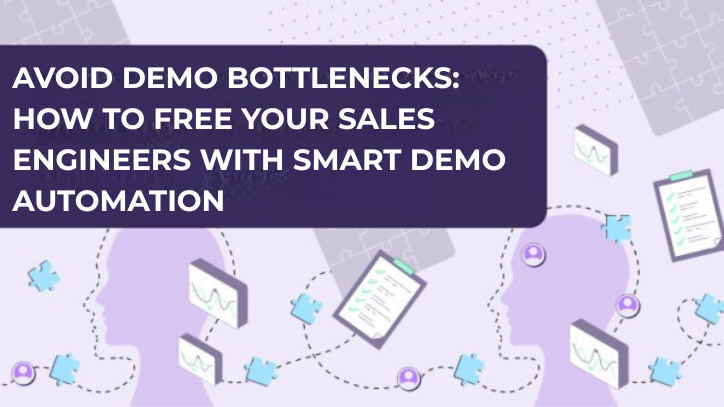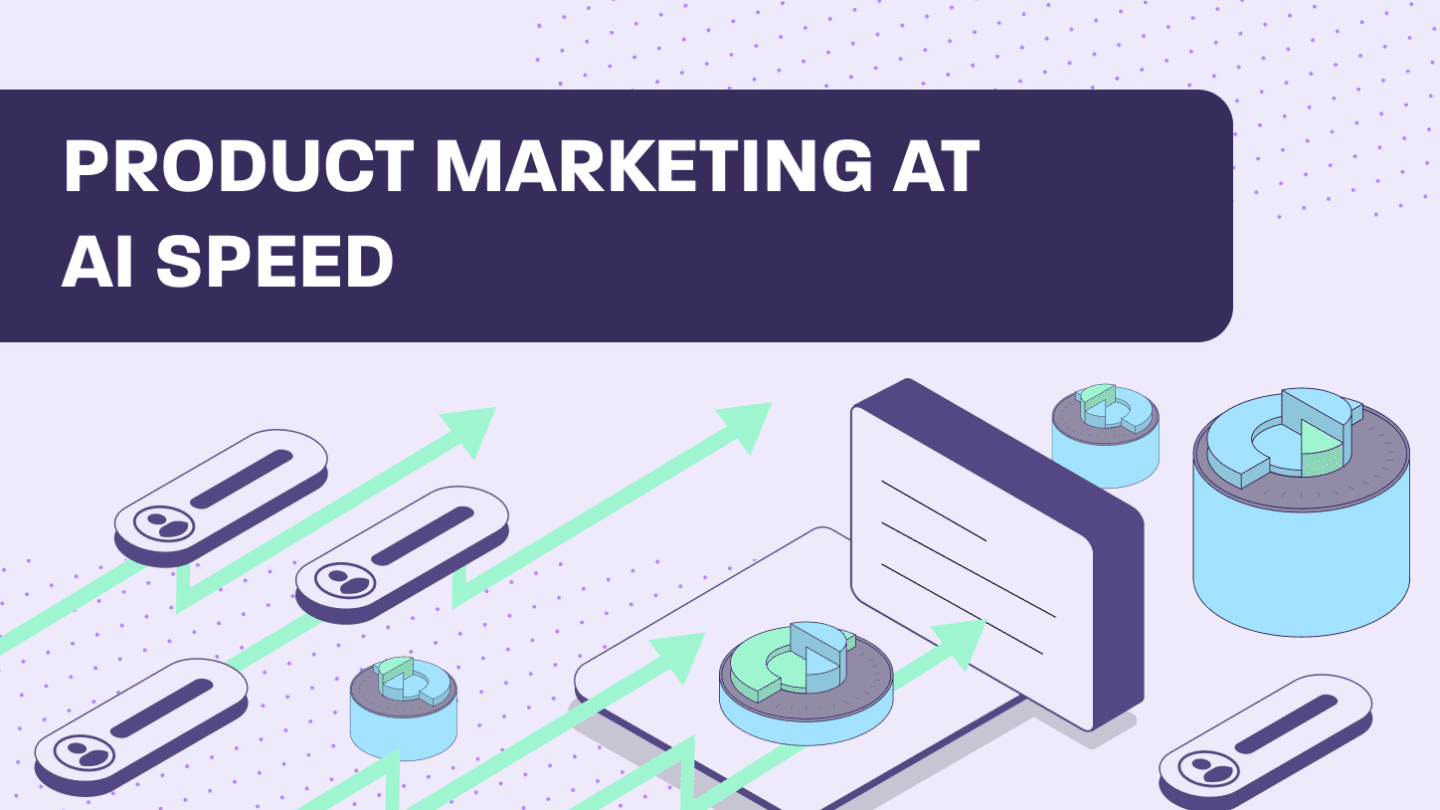TL;DR
Your sales engineers are your secret weapon—but only if they spend time on what matters. Here’s why giving your sales reps demo automation tools isn’t about replacing engineers—it’s about making their impact bigger and helping you avoid demo bottlenecks.
The Demo Bottleneck Problem Everyone Faces
Picture this happening at your company every day:
A good prospect wants to see your product in action. At first, the sales rep gets excited and sets up the call. However, reality hits fast: the sales engineer is already handling 12 other demo requests, three deep technical calls, and a trial that’s running late. Meanwhile, someone needs to build a custom demo from scratch with the prospect’s specific needs and data. As a result, the deal that had good momentum suddenly stops, waiting for technical help that’s already stretched too thin.
Does this sound familiar?
This is the classic way companies fail to avoid demo bottlenecks, and unfortunately, it’s quietly hurting your revenue, making sales cycles longer, and burning out your best technical people.
According to a recent study, 74% of sales leaders say engineers are crucial for winning deals—but they’re also overworked and not used well. Nevertheless, this problem isn’t just frustrating—it costs money. Furthermore, when your most valuable technical people are stuck reacting to requests all day, everyone loses.
When Sales Engineers Become Bottlenecks (And It’s Not Their Fault)
Let’s be clear: sales engineers weren’t hired to spend 60% of their time copying demo setups, changing demo scripts, or running the same basic product tour for the fifteenth time this week. Instead, they were hired to be technical advisors, solution builders, and the bridge between complex product features and real business results.
However, that’s exactly what many engineers find themselves doing every day.
As a result, the problems that follow are easy to predict and painful to experience:
Burnout and Retention Issues
When talented engineers spend their days doing the same tasks over and over instead of solving strategic problems, job satisfaction drops. As a result, you lose knowledge and face expensive hiring costs.
Longer Sales Cycles
Every demo request becomes a scheduling puzzle. Consequently, prospects wait days or weeks for their first product look, losing interest and checking out competitors.
Mixed Messages Across Deals
Without standard demo flows, each engineer creates their own approach. Therefore, your value message becomes like a game of telephone, getting weaker with each telling.
Lost Revenue Chances
When demo capacity becomes limited, sales reps start limiting demo requests. Subsequently, promising early opportunities get pushed aside, and your pipeline suffers.
The sad truth? It’s not because your engineers aren’t great—rather, it’s because they’re doing work that others could do better, faster, and more consistently.
How to Avoid Demo Bottlenecks by Empowering Sales (Without Losing Control)
What if your sales reps could confidently run polished, personalized product demos in the first or second conversation—without any engineer help? Furthermore, what if your sales team could keep momentum instead of hitting the demo scheduling wall every time a prospect shows interest?
This isn’t just wishful thinking. In fact, interactive demo platforms like Walnut are making this possible for smart sales teams.
Here’s how to avoid demo bottlenecks with this approach:
1. Let Sales Reps Own the First Demo
Instead of waiting for engineer availability, sales reps can share personalized, interactive demos that prospects can explore on their own or walk through together on the call. Moreover, this basic change:
- Makes demos happen faster from days or weeks to minutes
- Makes sellers more independent and confident in product talks
- Keeps your pipeline moving without capacity limits
- Makes prospects happier with instant access
Therefore, your prospects get their first real product experience while the conversation is still hot, and simultaneously, your sales reps build stronger technical trust.
2. Let Engineers Focus on Strategic, High-Value Work
When engineers are freed from first-demo duties, they can subsequently focus on work only they can do:
Technical Validation and Planning
Deep-dive sessions where engineers explore complex connections, security needs, and technical fit with qualified prospects.
Custom Trial and Sandbox Building
Creating sophisticated proof-of-concept environments that show your solution solving the prospect’s specific challenges.
Product and Engineering Teamwork
Working with product teams to influence roadmap priorities based on real customer needs and technical feedback from sales.
Advanced Solution Consulting
Acting as trusted advisors who help prospects see how your platform fits into their bigger technical picture.
In short, engineers stop being demo runners and become strategic technical advisors—ultimately, the role that actually moves deals forward and makes their expertise worth it.
3. Keep Control with Templates and Data
Demo automation doesn’t mean chaos or losing control. On the contrary, modern platforms provide smart management features:
Central Content Management
Engineers and product marketing can create and maintain demo templates that ensure consistent messaging and up-to-date product representation.
Version Control and Approval Steps
Every demo variation goes through proper review processes, thereby maintaining brand standards and technical accuracy.
Detailed Analytics and Insights
Track which demo flows convert prospects, where engagement drops off, and which features work best with different audience types.
Personalization at Scale
Sales reps can customize industry-specific or role-based demo experiences without rebuilding from scratch each time.
It’s empowerment with smart guardrails—consequently, your team gets flexibility without giving up quality or control.
Why Avoiding Demo Bottlenecks Matters More Than Ever
The business case for demo automation has never been stronger. Currently, market pressures are forcing every company to do more with limited resources, but the solution isn’t asking your engineers to work harder—instead, it’s helping your entire sales team work smarter.
Consider these compelling data points:
Speed Impact
Interactive demos can reduce time-to-first-demo by eliminating scheduling delays and resource limits. Furthermore, some companies report 28% shorter sales cycles when prospects can engage with product experiences right away.
Conversion Improvements
When prospects can explore your product on their own timeline, engagement goes up dramatically. In particular, studies show 36% more leads become sales-qualified when interactive demos are part of the early sales process.
Market Reality Check
The average B2B software deal already takes 83 days to close, and modern buyers increasingly want rep-free interactions during their research phase. Therefore, your ability to deliver immediate product value—without human bottlenecks—directly impacts your competitive position.
Resource Optimization
Every hour your engineers spend on routine first demos is an hour they’re not spending on strategic technical conversations that actually influence purchase decisions.
The Path Forward: How to Avoid Demo Bottlenecks Step by Step
Making this change successful requires careful planning:
Phase 1: Pilot Program
Start with your most technical sales reps and a subset of demo scenarios. Then, measure impact on demo volume, engineer utilization, and early-stage conversion rates.
Phase 2: Content Development
Work with your engineers and product marketing to build a library of interactive demo templates covering your most common use cases and industries.
Phase 3: Training and Enablement
Make sure your sales reps understand not just how to use the demo platform, but also when to use interactive demos versus when to escalate to engineer involvement.
Phase 4: Scale and Optimize
Finally, use analytics to continuously improve your demo experiences based on actual prospect behavior and conversion data.
Amplification, Not Replacement
The goal isn’t to eliminate SEs from the sales process—rather, it’s to amplify their impact by ensuring they spend their time on the conversations only they can have. When your AEs can handle initial product demonstrations confidently and effectively, your SEs become available for the strategic technical work that actually closes deals.
The organizations that embrace this evolution will find themselves with more responsive sales processes, more satisfied SE teams, and ultimately, more closed revenue. Therefore, the question isn’t whether demo automation will become standard practice—it’s whether you’ll be ahead of the curve or playing catch-up.
Your presales team remains your secret weapon. However, demo automation just makes sure they’re aimed at the right targets.





